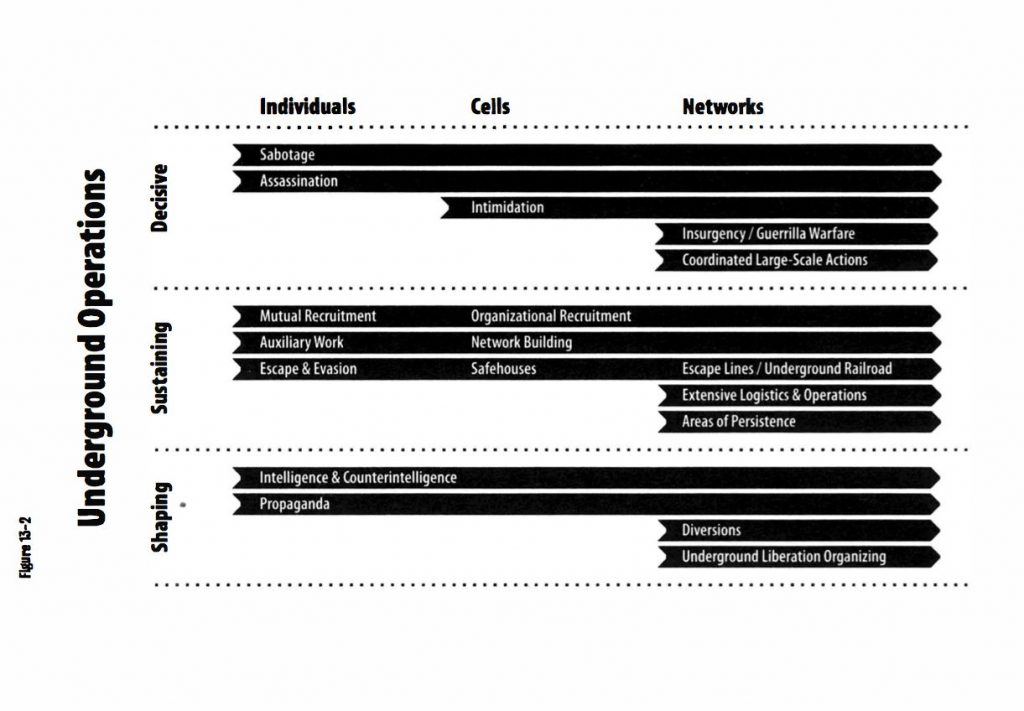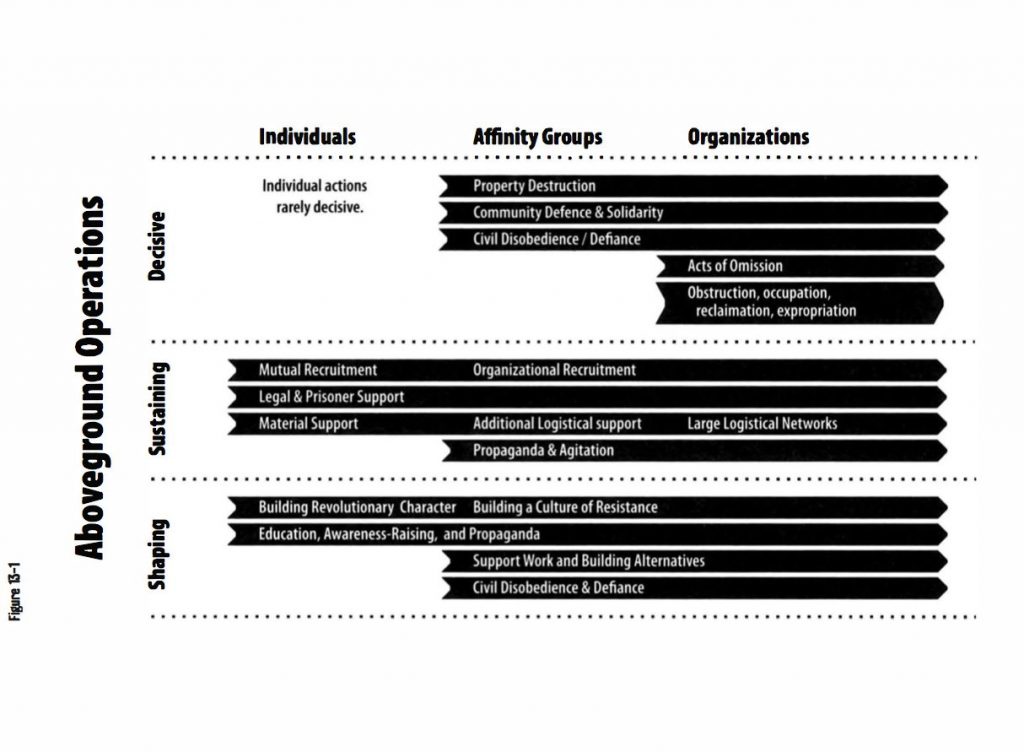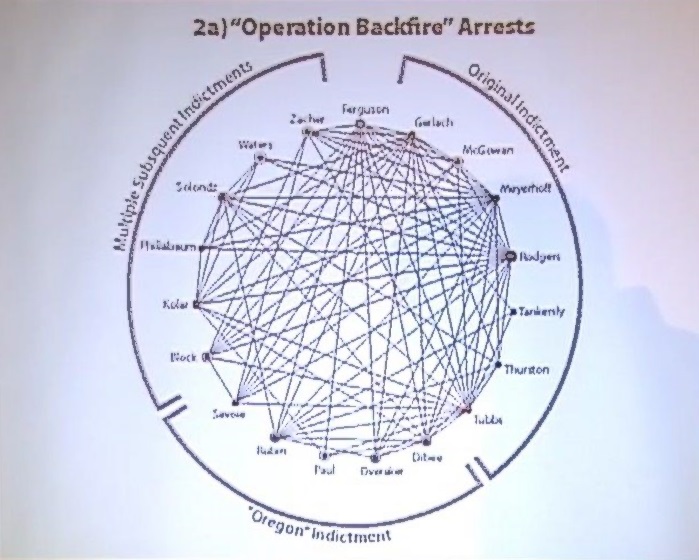by Deep Green Resistance News Service | Jul 3, 2016 | The Problem: Civilization
15 Realities of our Global Environmental Crisis
By Deep Green Resistance
- Industrial civilization is not, and can never be, sustainable.
Any social system based on the use of non-renewable resources is by definition unsustainable. Non-renewable means it will eventually run out. If you hyper-exploit your non-renewable surroundings, you will deplete them and die. Even for your renewable surroundings like trees, if you exploit them faster than they can regenerate, you will deplete them and die. This is precisely what civilization has been doing for its 10,000-year campaign – running through soil, rivers, and forests as well as metal, coal, and oil.
- Industrial civilization is causing a global collapse of life.
Due to industrial civilization’s insatiable appetite for growth, we have exceeded the planet’s carrying capacity. Once the carrying capacity of an area is surpassed, the ecological community is severely damages, and the longer the overshoot lasts, the worse the damage, until the population eventually collapses. This collapse is happening now. Every 24 hours up to 200 species become extinct. 90% of the large fish in the oceans are gone. 98% of native forests, 99% of wetlands, and 99% of native grasslands have been wiped out in the US.

- Industrial civilization is based on and requires ongoing systematic violence to operate.
This way of life is based on the perceived right of the powerful to take whatever resources they want. All land on which industrial civilization is now based on land that was taken by force from its original inhabitants, and shaped using processes – industrial forestry, mining, smelting – that violently shape the world to industrial ends. Traditional communities do not often voluntarily give up or sell resources on which their communities and homes are based and do not willingly allow their landbases to be damaged so that other resources – gold, oil, and so on – can be extracted. It follows that those who want the resources will do what they can to acquire these resources by any means necessary. Resource extraction cannot be accomplished without force and exploitation.
- In order for the world as we know it to exist on a day-to-day basis, a vast and growing degree of destruction and death must occur.
Industrialization is a process of taking entire communities of living beings and turning them into commodities and dead zones. Trace every industrial artifact back to its source and you find the same devastation: mining, clear-cuts, dams, agriculture, and now tar sands, mountaintop removal, and wind farms. These atrocities, and others like them, happen all around us, every day, just to keep things running normally. There is no kinder, greener version of industrial civilization that will do the trick of leaving us a living planet.
- This way of being is not natural.
Humans and their immediate evolutionary predecessors lived sustainably for at least a million years. It is not “human nature” to destroy one’s habitat. The “centralization of political power, the separation of classes, the lifetime division of labor, the mechanization of production, the magnification of military power, the economic exploitation of the weak, and the universal introduction of slavery and forced labor for both industrial and military purposes”[1] are only chief features of civilization, and are constant throughout its history.
- Industrial civilization is only possible with cheap energy.
The only reason industrial processes such as large-scale agriculture and mining even function is because of cheap oil; without that, industrial processes go back to depending on slavery and serfdom, as in most of the history of civilization.
- Peak oil, and hence the era of cheap oil, has passed.
Peak oil is the point at which oil production hits its maximum rate. Peak oil has passed and extraction will decline from this point onwards. This rapid decline in the availability of global energy will result in increasing economic disruption and upset. The increasing cost and decreasing supply of energy will undermine manufacturing and transportation and cause global economic turmoil. Individuals, companies, and even states will go bankrupt. International trade will nosedive because of a global depression. The poor will be unable to cope with the increasing cost of basic goods, and eventually the financial limits will result in large-scale energy-intensive manufacturing becoming impossible – resulting in, among other things – the collapse of agricultural infrastructure, and the associated transportation and distribution network.
At this point in time, there are no good short-term outcomes for global human society. The collapse of industrial civilization is inevitable, with or without our input, it’s just a matter of time. The problem is that every day the gears of this destructive system continue grinding is another day it wages war on the natural world. With up to 200 species and more than 80,000 acres of rainforest being wiped out daily as just some of the atrocities occurring systematically to keep our lifestyles afloat, the sooner this collapse is induced the better.
- “Green technologies” and “renewable energy” are not sustainable and will not save the planet.
Solar panels and wind turbines aren’t made out of nothing. These “green” technologies are made out of metals, plastics, and chemicals. These products have been mined out of the ground, transported vast distances, processed and manufactured in big factories, and require regular maintenance. Each of these stages causes widespread environmental destruction, and each of these stages is only possible with the mass use of cheap energy from fossil fuels. Neither fossil fuels nor mined minerals will ever be sustainable; by definition, they will run out. Even recycled materials must undergo extremely energy-intensive production processes before they can be reused.[2]

- Personal consumption habits will not save the planet.
Consumer culture and the capitalist mindset have taught us to substitute acts of personal consumption for organized political resistance. Personal consumption habits — changing light bulbs, going vegan, shorter showers, recycling, taking public transport — have nothing to do with shifting power away from corporations, or stopping the growth economy that is destroying the planet. Besides, 90% of the water used by humans is used by agriculture and industry. Three quarters of energy is consumed and 95% of waste is produced by commercial, industrial, corporate, agricultural and military industries. By blaming the individual, we are accepting capitalism’s redefinition of us from citizens to consumers, reducing our potential forms of resistance to consuming and not consuming.
- There will not be a mass voluntary transformation to a sane and sustainable way of living.
The current material systems of power make any chance of significant social or political reform impossible. Those in power get too many benefits from destroying the planet to allow systematic changes which would reduce their privilege. Keeping this system running is worth more to them than the human and non-human lives destroyed by the extraction, processing, and utilization of natural resources.
- We are afraid.
The primary reason we don’t resist is because we are afraid. We know if we act decisively to protect the places and creatures we love or if we act decisively to stop corporate exploitation of the poor, that those in power will come down on us with the full power of the state. We can talk all we want about how we live in a democracy, and we can talk all we want about the consent of the governed. But what it really comes down to is that if you effectively oppose the will of those in power, they will try to kill you. We need to make that explicit so we can face the situation we’re in: those in power are killing the planet and they are exploiting the poor, and we are not stopping them because we are afraid. This is how authoritarian regimes and abusers work: they make their victims and bystanders afraid to act.
- If we only fight within the system, we lose.
Things will not suddenly change by using the same approaches we’ve been using for the past 30 years. When nothing is working to stop or even slow the destruction’s acceleration, then it is time to change your strategy. Until now, most of our tactics and discourse (whether civil disobedience, writing letters and books, carrying signs, protecting small patches of forest, filing lawsuits, or conducting scientific research) remain firmly embedded in whatever actions are authorized by the overarching structures that permit the destruction in the first place.

- Dismantling industrial civilization is the only rational, permanent solution.
Our strategies until now have failed because neither our violent nor nonviolent responses are attempts to rid us of industrial civilization itself. By allowing the framing conditions to remain, we guarantee a continuation of the behaviors these framing conditions necessitate. If we do not put a halt to it, civilization will continue to immiserate the vast majority of humans and to degrade the planet until it (civilization, and probably the planet) collapses. The longer we wait for civilization to crash – or we ourselves bring it down – the messier will be the crash, and the worse things will be for those humans and nonhumans who live during it, and for those who come after.
- Militant resistance works.
Study of past social insurgencies and resistance movements shows that specific types of asymmetric warfare strategies are extremely effective.
- We must build a culture of resistance.
Some things, including a living planet, that are worth fighting for at any cost, when other means of stopping the abuses have been exhausted. One of the good things about industrial civilization being so ubiquitously destructive, is that no matter where you look – no matter what your gifts, no matter where your heart lies – there’s desperately important work to be done. Some of us need to file timber sales appeals and lawsuits. Some need to help family farmers or work on other sustainable agriculture issues. Some need to work on rape crisis hot lines, or at battered women’s shelters. Some need to work on fair trade, or on stopping international trade altogether. Some of us need to take down dams, oil pipelines, mining equipment, and electrical infrastructure.
We need to fight for what we love, fight harder than we have ever thought we could fight, because the bottom line is that any option in which industrial civilization remains, results in a dead planet.
Parts of this article were drawn from Deep Green Resistance: A Strategy to Save the Planet, by Aric McBay, Lierre Keith, and Derrick Jensen. If you want to help fight back, we recommend reading the book, browsing our list of ideas for taking action on your own, or volunteering with or joining Deep Green Resistance.
[1] Lewis Mumford, Myth of the Machine, Volume 2, Harcourt Brace Jovanovich, 1970, page 186.
[2] Recycled materials also usually degrade over time, limiting their recycling potential.
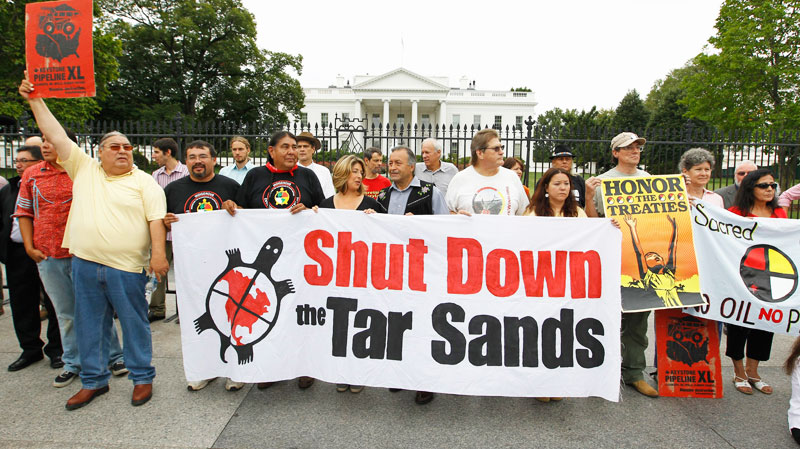
by Deep Green Resistance News Service | Nov 12, 2015 | Strategy & Analysis
by Clay Cochran / Deep Green Resistance
“The woods are lovely, dark and deep,
But I have promises to keep,
And miles to go before I sleep,
And miles to go before I sleep.”
-Robert Frost
President Obama announced Friday morning that he has denied TransCanada’s permit application to build the Keystone XL (KXL) oil pipeline in the U.S. Many in the mainstream environmental movement hailed this as a positive seismic shift in public policy and public perception, and a harbinger of the inevitable saving of our planet. Were it only that simple. Unfortunately, although the denial of the KXL build is in itself a good result, it carries with it some insidious dangers to the continuation of the fundamental work of saving this planet.
It is understandable that many think Obama’s denial of the KXL is a huge victory for the environment. Sadly, that view is myopic, and typical of the wishful thinking hampering the environmental movement around the world. The denial of the KXL does not accomplish what we ultimately need: the shutting down of the entire industrial, fossil-fuel driven society murdering the planet.
Unfortunately, the history of the environmental movement has many incidences where small victories have caused a loss of focus on the big picture, or otherwise misdirected us into falsely believing the one-off accomplishment sufficient to save our planet. Make no mistake, we must be ever vigilant not to let the leaders of industrial civilization (i.e. the greedy, patriarchal, conscious-less ‘leaders of industry’ and their paid-for politicians and mainstream media) characterize the globally suicidal events that are unfolding. They will always use a deceptive framework supporting their relentless need for unsustainable expansion, and lead many into losing sight of the ecologically desperate times that we are facing.
Deep Green Resistance believes the only way our planet can be saved for all species is for the current patriarchal and industrial civilization to be immediately dismantled. We also believe there is grave danger in premature self-congratulation for small accomplishments that seemingly are a win for the environment, but in truth do nothing to alter the existing paradigm of corporate power or slow the inevitable march towards unsustainable expansion and the murder of the planet. Simply stated, the processes that have been put in motion ― runaway climate change, population overshoot due to industrial agriculture, species extinctions, and ‘resource’ extraction ― are far too developed to be stopped by any means that allows the industrial complex to remain in existence.
In the book Deep Green Resistance, co-author Lierre Keith writes
”The culture of the left needs a serious overhaul. At our best and bravest moments, we are the people who believe in a just world; who fight the power with all the courage and commitment that women and men can possess; who refuse to be bought or beaten into submission, and refuse equally to sell each other out. The history of struggles for justice is inspiring, ennobling even, and it should encourage us to redouble our efforts now when the entire world is at stake. Instead, our leadership is leading us astray.”
Our leadership continues to lead us astray. President Obama gives lip service to his concern for global climate change guiding this KXL denial decision, but the truth is hidden in his message. According to a Scientific American article, among his reasons for rejection were that
…the pipeline would not make a meaningful long-term contribution to the U.S. economy, nor would it increase U.S. energy security or help to lower gas prices, which have already declined dramatically over the last year.
With these criteria for making his decision, we’re clearly not ready to take a victory lap for the environmental awakening of the global leadership.
Also in the DGR book, the authors discuss Lester Brown’s Plan B: Mobilizing to Save Civilization, pointing out that “although Mr. Brown is to be [commended] for understanding that the problems our planet is facing are systemic and interrelated, [his plan] unfortunately falls prey to what many other ‘plans’ do; it leaves the overlapping accelerants of capitalism, industrialization, and civilization in place.”
With the KXL decision in the news, it is critical to keep in mind the myriad disastrous ‘projects’ which continue unabated. As the DGR authors warn, these other projects evidence the hard truth that, so far, the work of the environmental movement has indeed left capitalism, industrialization, and civilization firmly in place. That three-headed monster has no intention of voluntarily leaving us to salvage what is left of our biosphere, so we are left with no other alternative than to terminate it ourselves, and with extreme prejudice.
A recent article in the Financial Post states:
While TransCanada Corp. has been cooling its heels on its Keystone XL proposal for the past six years, the oil pipeline business has been booming in the United States. Crude oil pipeline mileage rose 9.1 per cent last year alone to reach 66,649 miles. […] Between 2009 and 2013, more than 8,000 miles of oil transmission pipelines have been built in the past five years in the U.S., […] compared to the 875 miles TransCanada wants to lay in the states of Montana, South Dakota and Nebraska for its 830,000-bpd project. By last year, the U.S. had built 12,000 miles of pipe since 2010.
[AOPL spokesperson John Stoody said] “While people have been debating Keystone in the U.S. we have actually built the equivalent of 10 Keystones. And no one’s complained or said anything.”
A Climate Central article discusses the many alternative plans already developed to transport the tar sands of Canada:
As a way around those challenges, other pipelines are in the works. One pipeline is already operating and sending hundreds of thousands of barrels of tar sands bitumen to Texas every day.
Experts, such as Stephen Kelly, a former U.S. diplomat and a visiting professor of public policy and Canadian studies at Duke University, say that the long-term outlook for Canadian oil sands production is not closely linked to the fate of Keystone XL.
“Canada has ample financial incentive to find ways to get its oil to world markets, and it’s likely to find ways to build pipelines to its coast, despite opposition,” he said last year.
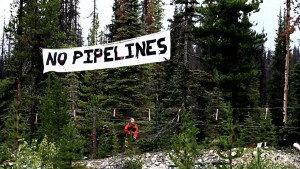 The Keystone XL decision and its accompanying self-congratulations should be a warning to us all not to lose sight of the big picture. The Keystone XL alternatives do face opposition in Canada from overlapping groups of climate activists, grassroots environmentalists concerned about local impacts, and First Nations peoples, with the Unis’tot’en Camp a prime example of a coalition for active on-the-ground resistance. We must remain vigilant in fighting pipelines and other infrastructure expansion projects wherever they’re proposed, and be skeptical of any misdirection from the fundamental work of ending the industrial-patriarchal complex.
The Keystone XL decision and its accompanying self-congratulations should be a warning to us all not to lose sight of the big picture. The Keystone XL alternatives do face opposition in Canada from overlapping groups of climate activists, grassroots environmentalists concerned about local impacts, and First Nations peoples, with the Unis’tot’en Camp a prime example of a coalition for active on-the-ground resistance. We must remain vigilant in fighting pipelines and other infrastructure expansion projects wherever they’re proposed, and be skeptical of any misdirection from the fundamental work of ending the industrial-patriarchal complex.
There is some good news. Deep Green Resistance believes that the insanity of the industrial planet-killing machine can be stopped. We believe that a sustainable and just world can be achieved, and we can transition away from being a consumer society. The Deep Green Resistance strategy of Decisive Ecological Warfare (DEW) is a recognition of the scope of what is at stake (the planet); an honest evaluation of the potential for a mass movement (none); and an assessment that industrial civilization depends on highly vulnerable infrastructure.
DEW keeps front-and-center the understanding that there will be no comprehensively successful environmental actions if we allow the current industrial framework to remain in existence. The people in power who are driving 200 species to extinction each day have no qualms about leading humans to the same fate, and show no signs of voluntarily altering their behaviors. It is well past time to make them stop.
I urge you to take a look at the Deep Green Resistance website and to reflect on the future of this planet. The Decisive Ecological Warfare strategy is multifaceted and needs your help, with work to be done wherever your skill set and interests lead you. Get involved and save our home.
If you’d like to read more analysis like this, and news of grassroots resistance to environmental destruction, sign up at the upper left of this page to receive email notifications of new posts.
by DGR Colorado Plateau | Jun 22, 2015 | Building Alternatives, Gender, Strategy & Analysis
In 1993 Michael Carter was arrested and indicted for underground environmental activism. Since then he’s worked aboveground, fighting timber sales and oil and gas leasing, protecting endangered species, and more. Today, he’s a member of Deep Green Resistance Colorado Plateau, and author of the memoir Kingfishers’ Song: Memories Against Civilization.
Time is Short spoke with him about his actions, underground resistance, and the prospects and problems facing the environmental movement. The first part of this interview is available here, and the second part here.
Time is Short: You mentioned some problems of radical groups—lack of respect for women and lack of a strategy. Could you expand on that?
Michael Carter: Sure. To begin with, I think both of those issues arise from a lifetime of privilege in the dominant culture. Men in particular seem prone to nihilism; I certainly was. Since we were taught—however unwittingly—that men are entitled to more of everything than women, our tendency is to bring this to all our endeavors.
I will give some credit to the movie “Night Moves” for illustrating that. The men cajole the woman into taking outlandish risks and they get off on the destruction, and that’s all they really do. When an innocent bystander is killed by their action, the woman has an emotional breakdown. She’s angry with the men because they told her no one would get hurt, and she breaches security by talking to other people about it. Their cell unravels and they don’t even explore their next options together. Instead of providing or even offering support, one of the men stalks and ultimately kills the woman to protect himself from getting caught, then vanishes back into mainstream consumer culture. So he’s not only a murderer but ultimately a cowardly hypocrite, as well.
Honestly, it appears to be more of an anti-underground propaganda piece than anything. Or maybe it’s just a vapid film, but it does have one somewhat valid point—that we white Americans, particularly men, are an overprivileged self-centered lot who won’t hesitate to hurt anyone who threatens us.
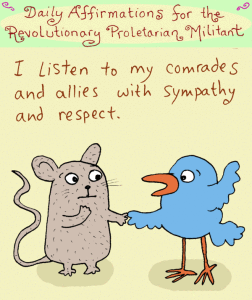
Artwork by Stephanie McMillan
That’s a fictional example, but any female activist can tell you the same thing. And of course misogyny isn’t limited to underground or militant groups; I saw all sorts of male self-indulgence and superiority in aboveground circles, moderate and radical both. It took hindsight for me to recognize it, even in myself. That’s a central problem of radical environmentalism, one reason why it’s been so ineffective. Why should any woman invest her time and energy in an immature movement that holds her in such low regard? I’ve heard this complaint about Occupy groups, anarchists, aboveground direct action groups, you name it.
Groups can overcome that by putting women in positions of leadership and creating secure, uncompromised spaces for them to do their work. I like to reflect on the multi-cultural resistance to the Burmese military dictatorship, which is also a good example of a combined above- and underground effort, of militant and non-violent tactics. The indigenous people of Burma traditionally held women in positions of respect within their cultures, so they had an advantage in building that into their resistance movements, but there’s no reason we couldn’t imitate that anywhere. Moreover, if there are going to be sustainable and just cultures in the future, women are going to be playing critical roles in forming and running them, so men should be doing everything possible to advocate for their absolute human rights.
As for strategy, it’s a waste of risk-taking for someone to cut down billboards or burn the paint off bulldozers. It’s important not to equate willingness with strategy, or radicalism and militancy with intelligence. For example, I just noticed an oil exploration subcontractor has opened an office in my town. Bad news, right? I had a fleeting wish to smash their windows, maybe burn the place down. That’ll teach ‘em, they’ll take us seriously then. But it wouldn’t do anything, only net the company an insurance settlement they’d rebuild with and reinforce the image of militant activists as mindless, dangerous thugs.
If I were underground, I’d at least take the time to choose a much more costly and hard-to-replace target. I’d do everything I could to coordinate an attack that would make it harder for the company to recover and continue doing business. And I’d only do these things after I had a better understanding of the industry and its overall effects, and a wider-focused examination of how that industry falls into the mechanism of civilization itself.
By widening the scope further, you see that ending oil and gas development might better be approached from an aboveground stance—by community rights initiatives, for example, that have outlawed fracking from New York to Texas to California. That seems to stand a much better chance of being effective, and can be part of a still wider strategy to end fossil fuel extraction altogether, which would also require militant tactics. You have to make room for everything, any tactic that has a chance of working, and begin your evaluation there.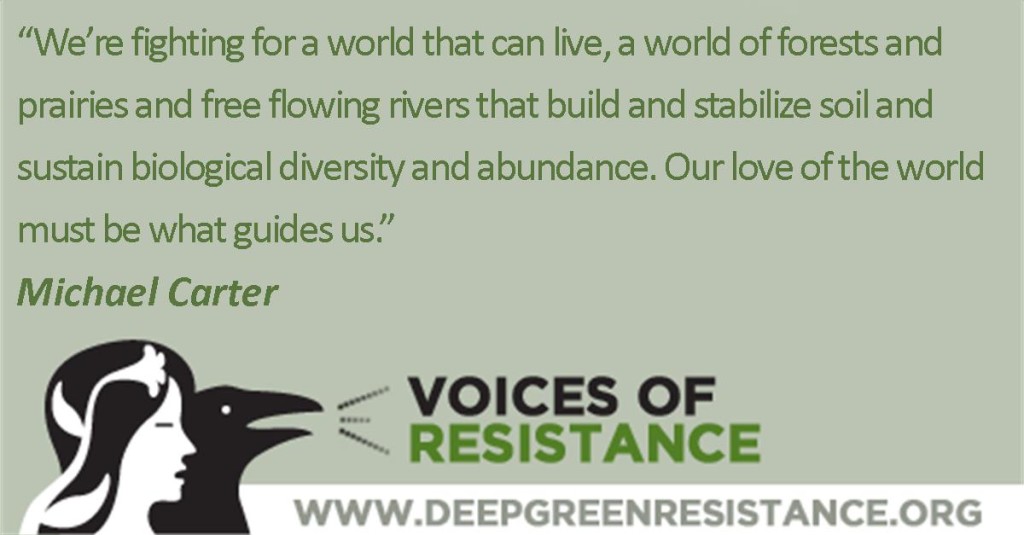
To use the Oak Flat copper mine example, now the mine is that much closer to happening, and the people working against it have to reappraise what they have available. That particular issue involves indigenous sacred sites, so how might that be respectfully addressed, and employed in fighting the mine aboveground? Might there be enough people to stop it with civil disobedience? Is there any legal recourse? If there isn’t, how might an underground cell appraise it? Are there any transportation bottlenecks to target, any uniquely expensive equipment? How does timing fit in? How about market conditions—hit them when copper prices are down, maybe? Target the parent company or its other subsidiaries? What are the company’s financial resources?
An underground needs a strategy for long-term success and a decision-making mechanism that evaluates other actions. Then they can make more tightly focused decisions about tactics, abilities, resources, timing, and coordinated effort. The French Resistance to the Nazis couldn’t invade Berlin, but they sure could dynamite train tracks. You wouldn’t want to sabotage the first bulldozer you came across in the woods; you’d want to know who it belonged to, if it mattered, and that you weren’t going to get caught. Maybe it belongs to a habitat restoration group, who can say? It doesn’t do any good to put a small logging contractor out of business, and it doesn’t hurt a big corporation to destroy machinery that is inexpensive, so those questions need to be answered beforehand. I think successful underground strikes must be mostly about planning; they should never, never be about impulse.
TS: There are a lot of folks out there who support the use of underground action and sabotage in defense of Earth, but for any number of reasons—family commitments, physical limitations, and so on—can’t undertake that kind of action themselves. What do you think they can do to support those willing and able to engage in militant action?
MC: Aboveground people need to advocate underground action, so those who are able to be underground have some sort of political platform. Not to promote the IRA or its tactics (like bombing nightclubs), but its political wing of Sinn Fein is a good example. I’ve heard a lot of objections to the idea of advocating but not participating in underground actions, that there’s some kind of “do as I say, not as I do” hypocrisy in it, but that reflects a misunderstanding of resistance movements, or the requirements of militancy in general. Any on-the-ground combatant needs backup; it’s just the way it is. And remember that being aboveground doesn’t guarantee you any safety. In fact, if the movement becomes effective, it’s the aboveground people most vulnerable to harm, because they’re going to be well known. In that sense, it’s safer to be underground. Think of the all the outspoken people branded as intellectuals and rounded up by the Nazis.
The next most important support is financial and material, so they can have some security if they’re arrested. When environmentalists were fighting logging in Clayoquot Sound on Vancouver Island in the 1990s, Paul Watson (of the Sea Shepherd Conservation Society) offered to pay the legal defense of anyone caught tree spiking. Legal defense funds and on-call pro-bono lawyers come immediately to mind, but I’m sure that could be expanded upon. Knowing that someone is going to help if something horrible happens, combatants can take more initiative, can be more able to engineer effective actions.
We hope there won’t be any prisoners, but if there are, they must be supported too. They can’t just be forgotten after a month. As I mentioned before, even getting letters in jail is a huge morale booster. If prisoners have families, it’s going to make a big difference for them to know that their loved ones aren’t alone and that they will have some sort of aboveground material support. This is part of what we mean when we talk about a culture of resistance.
TS: You’ve participated in a wide range of actions, spanning the spectrum from traditional legal appeals to sabotage. With this unique perspective, what do you see as being the most promising strategy for the environmental movement?
MC: We need more of everything, more of whatever we can assemble. There’s no denying that a lot of perfectly legal mainstream tactics can work well. We can’t litigate our way to sustainability any more than we can sabotage our way to sustainability; but for the people who are able to sue the enemy, that’s what they should be doing. Those who don’t have access to the courts (which is most everyone) need to find other roles. An effective movement will be a well-organized movement, willing to confront power, knowing that everything is at stake.
Decisive Ecological Warfare is the only global strategy that I know of. It lays out clear goals and ways of arranging above- and underground groups based on historical examples of effective movements. If would-be activists are feeling unsure, this might be a way for them to get started, but I’m sure other plans can emerge with time and experience. DEW is just a starting point.
Remember the hardest times are in the beginning, when you’re making inevitable mistakes and going through abrupt learning curves. When I first joined Deep Green Resistance, I was very uneasy about it because I still felt burned out from the ‘90s struggles. What I’ve discovered is that real strength and endurance is founded in humility and respect. I’ve learned a lot from others in the group, some of whom are half my age and younger, and that’s a humbling experience. I never really understood what a struggle it is for women, either, in radical movements or the culture at large; my time in DGR has brought that into focus.
Look at the trans controversy; here are males asking to subordinate women’s experiences and safe spaces so they can feel comfortable. It’s hard for civilized men to imagine relationships that aren’t based on the dominant-submissive model of civilization, and I think that’s what the issue is really about—not phobia, not exclusionary politics, but rather role-playing that’s all about identity. Male strength traditionally comes from arrogance and false pride, which naturally leads to insecurity, fear, and a need to constantly assert an upper hand, a need to be right. A much more secure stance is to recognize the power of the earth, and allow ourselves to serve that power, not to pretend to understand or control it.
 TS: We agree that time is not on our side. What do you think is on our side?
TS: We agree that time is not on our side. What do you think is on our side?
MC: Three things: first, the planet wants to live. It wants biological diversity, abundance, and above all topsoil, and that’s what will provide any basis for life in the future. I think humans want to live, too; and more than just live, but be satisfied in living well. Civilization offers only a sorry substitute for living well to only a small minority.
The second is that activists now have a distinct advantage in that it’s easier to get information anonymously. The more that can be safely done with computers, including attacking computer systems, the better—but even if it’s just finding out whose machinery is where, how industrial systems are built and laid out, that’s much easier to come by. On the other hand the enemy has a similar advantage in surveillance and investigation, so security is more crucial than ever.
The third is that the easily accessible resources that empires need to function are all but gone. There will never be another age of cheap oil, iron ore mountains, abundant forest, and continents of topsoil. Once the infrastructure of civilized humanity collapses or is intentionally broken, it can’t really be rebuilt. Then humans will need to learn how to live in much smaller-scale cultures based on what the land can support and how justly they treat one another. That will be no utopia, of course, but it’s still humanity’s best option. The fight we’re now engaged in is over what living material will be available for those new, localized cultures—and more importantly, the larger nonhuman biological communities—to sustain themselves. What polar bears, salmon, and migratory birds need, we will also need. Our futures are forever linked.
Time is Short: Reports, Reflections & Analysis on Underground Resistance is a bulletin dedicated to promoting and normalizing underground resistance, as well as dissecting and studying its forms and implementation, including essays and articles about underground resistance, surveys of current and historical resistance movements, militant theory and praxis, strategic analysis, and more. We welcome you to contact us with comments, questions, or other ideas at undergroundpromotion@deepgreenresistance.org

by DGR Colorado Plateau | Apr 25, 2015 | Agriculture, Building Alternatives, Strategy & Analysis
In 1993 Michael Carter was arrested and indicted for underground environmental activism. Since then he’s worked aboveground, fighting timber sales and oil and gas leasing, protecting endangered species, and more. Today, he’s a member of Deep Green Resistance Colorado Plateau, and author of the memoir Kingfishers’ Song: Memories Against Civilization.
Time is Short spoke with him about his actions, underground resistance, and the prospects and problems facing the environmental movement. The first part of this interview is available here, and the third part here.
Time is Short: Your actions weren’t linked to other issues or framed in a greater perspective. How important do you think having well-framed analysis is in regards to sabotage and other such actions?
Michael Carter: It is the most important thing. Issue framing is one of the ways that dissent gets defeated, as with abortion rights, where the issue is framed as murder versus convenience. Hunger is framed as a technical difficulty—how to get food to poor people—not as an inevitable consequence of agriculture and capitalism. Media consumers want tight little packages like that.
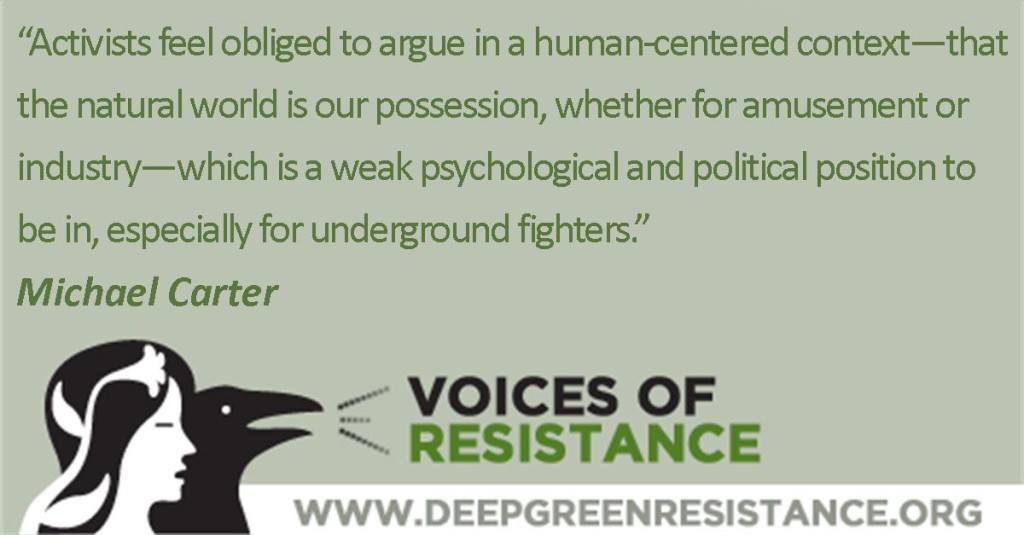
In the early ‘90s, wilderness and biodiversity preservation were framed as aesthetic issues, or as user-group and special interests conflict; between fishermen and loggers, say, or backpackers and ORVers. That’s how policy decisions and compromises were justified, especially legislatively. My biggest aboveground campaign of that time was against a Montana wilderness bill, because of the “release language” that allowed industrial development of roadless federal lands. Yet most of the public debate revolved around an oversimplified comparison of protected versus non-protected acreage numbers. It appeared reasonable—moderate—because the issue was trivialized from the start.
That sort of situation persists to this day, where compromises between industry, government, and corporate environmentalists are based on political framing rather than biological or physical reality—an area that industry or motorized recreationists would agree to protect might have no capacity for sustaining a threatened species, however reasonable the acreage numbers might look. Activists feel obliged to argue in a human-centered context—that the natural world is our possession, whether for amusement or industry—which is a weak psychological and political position to be in, especially for underground fighters.

Artwork by Stephanie McMillan
When I was one of them, I never felt I had a clear stance to work from. Was I risking a decade in prison for a backpacking trail? No. Well then what was I risking it for? I chose not to think that deeply, just to rampage onward. That was my next worst mistake after bad security. Without clear intentions and a solid understanding of the situation, actions can become uncoordinated, and potentially meaningless. No conscientious aboveground movement will support them. You can get entangled in your own uncertainty.
If I were now considering underground action—and of course I’m not, you must choose to be aboveground or underground and stick with it, another mistake I made—I would view it as part of a struggle against a larger power structure, against civilization as a whole. It’s important to understand that this is not the same thing as humanity.
TS: You called civilization a plan based on agriculture. Could you expand on that?
MC: Nothing else that the dominant culture does, industrial forestry and fishing, generating electricity, extracting fossil fuels, is as destructive as agriculture. None of it’s possible without agriculture. There’s some forty years of topsoil left, and agriculture is burning through it as if it will last forever, and it can’t. Topsoil is the sand in civilization’s hourglass, the same as fossil fuels and mineral ores; there is only so much of it. When it comes to physical limits, civilization has no rationality, or even a sense of its own ultimate self-interest; only a hidden-in-plain-sight secret that it’s going to consume everything. In a finite world it can never function for long, and all it’s doing now is grinding through the last frontiers. If civilization is still continuing twenty years from now, it won’t matter how many wilderness areas are designated; civilization is going to consume those wilderness areas.
TS: How is that analysis helpful? If civilization can never be sustained, doesn’t that remove any hope of success?
MC: If we’re serious about protecting life and promoting justice, we have to acknowledge that civilized humanity will never voluntarily take the steps needed for a sustainable way of life, because its history is entirely about war and occupation. That’s what civilization does: wage war and occupy land. It appears as though this is progress, that it’s humanity itself, but it’s not. Civilization will always make power and dominance its priority, and will never allow its priority to be challenged.
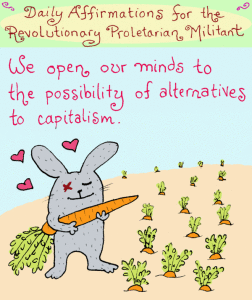
Artwork by Stephanie McMillan
For example, production of food could be fairly easily converted from annual grains to perennial grasses, producing milk, eggs, and meat. Polyface Farms in Virginia has demonstrated how eminently possible this is; on a large scale that would do enormous good, sequestering carbon and lowering diabetes, obesity, and pesticide and fertilizer use. But grass can’t be turned into a commodity; it can’t be stored and traded, so it can never serve capitalism’s needs. So that debate will never come up on CNN, because it falls so far outside the issue framing. Hardly anyone is discussing what’s really wrong, only which capitalist or nation state will get to the last remaining resources first and how technology might cope with the resulting crises.
Another example is the proposed copper mine at Oak Flat, near Superior, Arizona. The Eisenhower administration made the land off-limits to mining in 1955, and in December 2014 the US Senate reversed that with a rider to a defense authorization bill, and Obama signed it. Arizona Senator John McCain said, “To maintain the strength of the most technologically-advanced military in the world, America’s armed forces need stable supplies of copper for their equipment, ammunition, and electronics.” See how he justifies mining copper with military need? He’s closed the discussion with an unassailable warrant, since no one in power—and hardly anyone in the public at large—is going to question the military’s needs.
TS: Are you saying there’s no chance of voluntary reform?
MC: I’m saying that it’s going to be a fight. Significant social change is usually involuntary, contrary to popular notions about “being the change you want to see in the world” and “majority rules.” Most southern whites didn’t want the US Civil Rights Movement to exist, much less succeed. In the United States democracy is mostly a fictional theory anyway, because a tiny financial and political elite run the show.
For example, in the somewhat progressive state of Oregon, the agriculture lobby successfully defeated a measure to label foods containing genetically modified organisms. A majority of voters agreed they shouldn’t know what’s in their food, their most intimate need, because those in power had enough money to convince them. There’s little hope in trying to reason with the people who run civilization, or who are otherwise trapped by it, politically or financially or however. So long as the ruling class is able to extract wealth from the land and our labor, they will. If they’ve got the machinery and fuel to run their economy, they will eventually find the political bypasses to make it happen. It will consume lives and land until there’s nothing left to consume. When the soil is gone, that’s essentially it for the human species.

Oak Flat, Arizona
What’s the point of compromising with a political system that’s patently insane? A more sensible way of approaching the planet’s predicament would be to base tactical decisions on a strategy to strip power from those who are destroying the planet. This is the root, what we have to mean when we call it a radical—root-focused—struggle.
Picture a world with no food, rising temperatures, disease epidemics, drought, war. We see it unfolding now. This is what we’re fighting against. Or rather we’re fighting for a world that can live, a world of forests and prairies and free flowing rivers that build and stabilize soil and sustain biological diversity and abundance. Our love of the world must be what guides us.
TS: You’re suggesting a struggle that completely changes how humans have arranged themselves, the end of the capitalist economy, the eventual collapse of the nation-state model of society. That sounds impossibly difficult. How might resisters approach that?
MC: We can begin by building a movement that functions as a cultural replacement for the culture we’re stuck in now. Since civilized culture isn’t going to support anyone trying to take it apart, we need other systems of material, psychological, and emotional support.
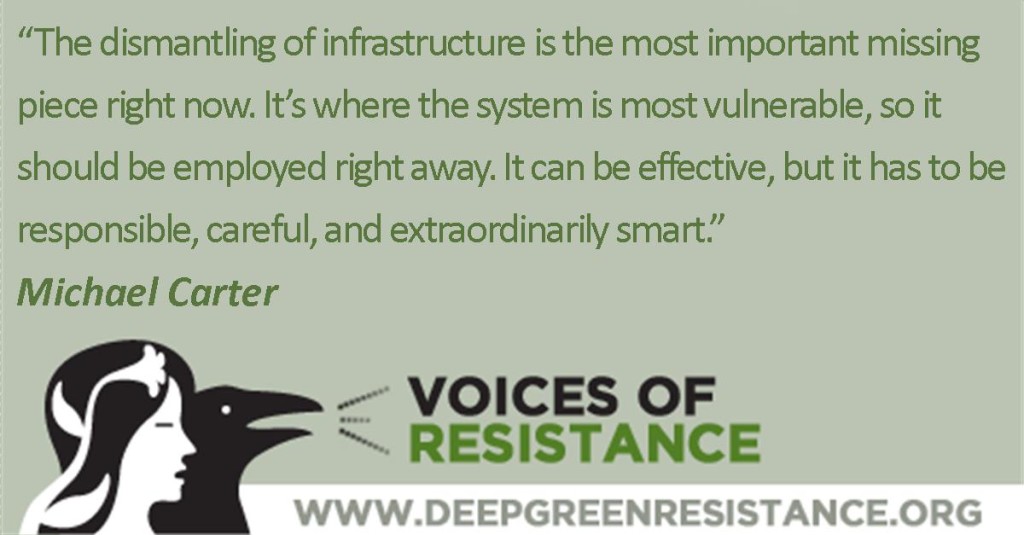
This would be particularly important for an underground movement. Ideally they would have a community that knows their secrets and works alongside them, just as militaries do. Building that network will be difficult to do in secret, because if they’re observing tight security, how do they even find others who agree with them? But because there’s little one or two people can do by themselves, they’ll have to find ways to do it. That’s a problem of logistics, however, and it’s important to separate it from personal issues.
When I was doing illegal actions, I wanted people to notice me as a hardcore environmentalist, which under the circumstances was foolish and narcissistic to the point of madness. If you have issues like that—and lots of people do, in our bizarre and hurtful culture—you need to resolve them with self-reflection and therapy, not activism. The most elegant solution would be for your secret community to support and acknowledge you, to help you find the strength and solidarity you need to do hard and necessary work, but there are substitutes available all the same.
TS: You’ve been involved with aboveground environmental work in the years since your underground actions. What have you worked on, and what are you doing now?
MC: I first got involved with forestry issues—writing timber sale appeals and that sort of thing. Later I helped write petitions to protect species under the Endangered Species Act. I burned out on that, though, and it took me a long time to get drawn back in. Aboveground people need the support of a community, too—more than ever. Derrick Jensen’s book A Language Older Than Words clarified the global situation for me, answered many questions I had about why things are so difficult right now. It taught me to be aware that as civilized culture approaches its end, people are getting ever more self-absorbed, apathetic, and cruel. Those who are still able to feel need to stand by each other as well as they can.
When Deep Green Resistance came into being, it was a perfect fit, and I’ve been focused on helping build that movement. Susan Hyatt and I are doing an essay series on the psychology of civilization, and how to cultivate the mental health needed for resistance. I’m also interested in positive underground propaganda. Having stories to support what people are doing and thinking is important. It helps cultivate the confidence and courage that activists need. That’s why governments publish propaganda in wartime; it works.
TS: So you think propaganda can be helpful?
MC: Yes, I do. The word has a negative connotation for some good reasons, but I don’t think that attempting to influence thoughts and actions with media is necessarily bad, so long as it’s honest. Nazi Germany used propaganda, but so did George Orwell and John Steinbeck. If civilization is brought down—that is, if the systems responsible for social injustice and planetary destruction are permanently disabled—it will require a sustained effort for many years by people who choose to act against most everything they’ve been taught to believe, and a willingness to risk their freedom and lives to bring it about. Entirely new resistance cultures will be needed. They will require a lot of new stories to sustain a vision of who humans really are, and what our lives are for, how they relate to other living things. So far as I know there’s little in the way of writing, movies, any sort of media that attempts to do that.
Edward Abbey wrote some fun books, and they were all we had; so we went along hoping we’d have some of that fun and that everything might come out all right in the end. We no longer have that luxury for self-indulgence. I’m not saying humor doesn’t have its place—quite the opposite—but the situation of the planet and social situation of civilization is now far more dire than it was during Abbey’s time. Effective propaganda should reflect that—it should honestly appraise the circumstances and realistically compose a response, so would-be resisters can choose what their role is going to be.
This is important for everyone, but especially important for an underground. In World War II, the Allies distributed Steinbeck’s propaganda novel The Moon is Down throughout occupied Europe. It was a short, simple book about how a small town in Norway fought against the Nazis. It was so mild in tone that Steinbeck was accused by some in the US government of sympathizing with the enemy for his realistic portrayal of German soldiers as mere people in an awful situation, and not superhuman monsters. Yet the occupying forces would shoot anyone on the spot if they caught them with a copy of the book. Compare that to Abbey’s books, and you see how far short The Monkey Wrench Gang falls of the necessary task.
TS: Can you suggest any contemporary propaganda?
Derrick Jensen’s Endgame books are the best I can think of, and the book Deep Green Resistance. There’s some negative-example propaganda worth mentioning, too. The book A Friend of the Earth, by T.C. Boyle. The movies “The East” and “Night Moves” are both about underground activists, and they’re terrible movies, at least as propaganda for effective resistance. “The East” is about a private security firm that infiltrates a cell whose only goals are theater and revenge, and “Night Moves” is even worse, about two swaggering men and one unprepared woman who blow up a hydroelectric dam.
The message is, “Don’t mess with this stuff, or you’ll end up dead.” But these films do point out some common problems of groups with an anarchistic mindset: they tend to belittle women and they operate without a coherent strategy. They’re in it for the identity, for the adrenaline, for the hook-up prospects—all terrible reasons to engage. So I suppose they’re worth a look for how not to behave. So is the documentary film “If a Tree Falls,” about the Earth Liberation Front.
Social change movements can suffer from problems of immaturity and self-infatuation just like individuals can. Radical environmentalism, like so many leftist causes, is rife with it. Most of the Earth First!ers I knew back in the ‘90s were so proud of their partying prowess, you couldn’t spend any time with them without their getting wasted and droning on about it all the next day. One of the reasons I drifted away from that movement was it was so full of arrogant and judgmental people, who seemed to spend most of their time criticizing their colleagues for impure living because they use paper towels or drive an old pickup instead of a bicycle.
This can lead to ridiculous guilt-tripping pissing matches. It’s no wonder environmentalists have such a bad reputation among the working class, when they’re indulging in self-righteous nitpicking that’s really just a reflection of their own circumstantial advantages and lack of focus on effectively defending the land. Tell a working mother to mothball her dishwasher because you heard it’s inefficient, see how far you get. It’s one of the worst things you can say to anyone, especially because it reinforces the collective-burden notion of responsibility for environmental destruction. This is what those in power want us to think. Developers build new golf courses in the desert, and we pretend we’re making a difference by dry-brushing our teeth. Who cares who’s greener than thou? The world is being gutted in front of our eyes.
Interview continues here.
Time is Short: Reports, Reflections & Analysis on Underground Resistance is a bulletin dedicated to promoting and normalizing underground resistance, as well as dissecting and studying its forms and implementation, including essays and articles about underground resistance, surveys of current and historical resistance movements, militant theory and praxis, strategic analysis, and more. We welcome you to contact us with comments, questions, or other ideas at undergroundpromotion@deepgreenresistance.org
by DGR Colorado Plateau | Mar 8, 2015 | Property & Material Destruction, Repression at Home, Strategy & Analysis
In 1993 Michael Carter was arrested and indicted for underground environmental activism. Since then he’s worked aboveground, fighting timber sales and oil and gas leasing, protecting endangered species, and more. Today, he’s a member of Deep Green Resistance Colorado Plateau, and author of the memoir Kingfishers’ Song: Memories Against Civilization.
Time is Short spoke with him about his actions, underground resistance, and the prospects and problems facing the environmental movement. Due to the length of the interview, we’ve presented it in three installments; go to Part II here, and Part III here.
Time is Short: Can you give a brief description of what it was you did?
Michael Carter: The significant actions were tree spiking—where nails are driven into trees and the timber company warned against cutting them—and sabotaging of road building machinery. We cut down plenty of billboards too, and this got most of the media attention. We did this for about two years in the late ‘80s and early ‘90s, about twenty actions. My brother Sean was also indicted. The FBI tried to round up a larger conspiracy, but that didn’t stick.
TS: How did you approach those actions? What was the context?
MC: We didn’t know a lot about environmental issues or political resistance, so we didn’t have much understanding of context. We had an instinctive dislike of clear cuts, and we had the book The Monkey Wrench Gang. Other people were monkeywrenching, that is, sabotaging industry to protect wilderness, so we had some vague ideas about tactics but no manual, no concrete theory. We knew what Earth First! was, although we weren’t members. It was a conspiracy only in the remotest sense. We had little strategy and the actions were impetuous. If we’d been robbing banks instead, we’d have been shot in the act.
Nor did we really understand how bad the problem was. We thought that deforestation was damaging to the land, but we didn’t get the depth of its implications and we didn’t link it to other atrocities. We just thought that we were on the extreme edge of the marginal issue of forestry. This was before many were talking about global warming or ocean acidification or mass extinction. It all seemed much less severe than now, and of course it was. The losses since then, of species and habitat and pollution, are terrible. No monkeywrenching I know of did anything significant to stop that. It was scattered, aimed at minor targets, and had no aboveground political movement behind it.
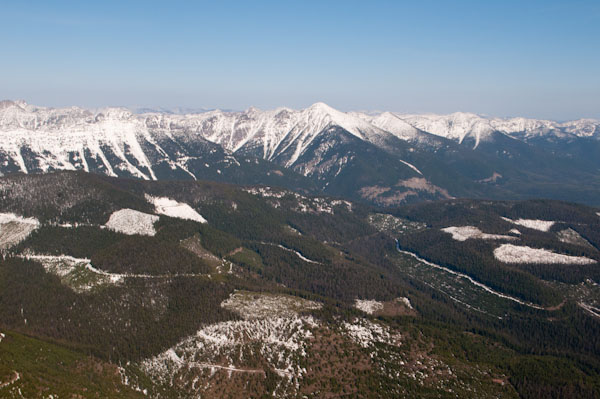
Clearcuts in the Swan Valley, MT near Loon Lake on the slope of Mission Mountains. Photo by George Wuerthner.
TS: What was the public response to your actions?
MC: They saw them as vandalism, mindlessly criminal, even if they were politically motivated. This was before 9/11, before the Oklahoma City bombing; the idea of terrorism wasn’t so powerful, so our actions weren’t taken nearly as seriously as they would be now.
We were charged by the state of Montana with criminal mischief and criminal endangerment. The state’s evidence was solid enough we thought we couldn’t win a trial, so we pled guilty on the chance the judge wouldn’t send us to prison. Our defense was to say, “We’re sorry we did it, it was motivated by sincerity but it was dumb.” And that was true. We were able to get our charges reduced from criminal endangerment to criminal mischief. I got a 19 year suspended prison sentence, Sean got 9 years suspended. We both had to pay a lot of money, some $40,000, but I only spent three months in county jail and Sean got out of a jail sentence altogether. We were lucky.
TS: As you said, this was before the obsessive fear of terrorism. How do you think that played into your trial and indictment, and how do you think it would be different today?
MC: Had it happened after any big terrorism event, they would have sent us to prison, there’s no doubt about that. States have to maintain a level of constant fear and prove themselves able to protect citizens.
The irony was, I’m not sure I wanted to be serious—there seemed to be something protective in not being all that effective, in being intentionally quixotic, in being a little cute about it. There was a particularly comical aspect to cutting down billboards, and that was helpful only when I was arrested. It made it look less like terrorism and more like reckless things I did when I was drunk, and a lot of people approved of it because they thought billboards were tacky. I want to emphasize that cutting down billboards is nothing I’d advise anyone to consider, only that a little bit of public approval made a surprising difference to my morale, and may have positively influenced sentencing. But the point, of course, is to be effective and not get caught in the first place. These days, if someone gets caught in underground actions, they will be in a lot more trouble than ever before.
TS: How did you get caught?
We left fingerprints and tire tracks, we rented equipment under our own names—like an acetylene torch used to cut down steel billboard posts—and we told people who didn’t need to know about it. We assumed we were safe if they didn’t catch us in the act and because our fingerprints weren’t on file, and we couldn’t have been more wrong. The cops can subpoena anyone’s fingerprints, and use that evidence for something in the past. The importance of security can’t be overstated—and we didn’t have any. Even with a couple rudimentary precautions, we might have saved ourselves the whole ordeal of getting caught. If we’d read the security chapter of Dave Foreman’s book Ecodefense, I don’t think we would have even come under suspicion. Anyone taking any action, above- or underground, needs to take the time to learn security well.
It’s not just saving yourself the anguish of arrest and prison time. If you’re rigorous about security, you might be able to have a real chance at changing how the future of the planet plays out. You can have no impact at all in a jail cell. In our case, we definitely could have stopped timber sales with tree spiking even though that tactic was extremely unpopular politically. It was seen as an act of violence against innocent lumber mill workers instead of a preventative measure to protect forests. The dilemma never got past that stage, though. We had little chance of having any reasoned tactical considerations—let alone making reasoned decisions—because we were always a little too afraid of being caught. With good reason, it turns out.
TS: What have you learned from your experience? Looking back on what you did all those years ago, what’s your perspective on your actions now? Is there anything you would have done differently?
MC: Well I definitely would have taken steps to not get caught. I would have picked my targets more carefully, and I would have entered into an understanding with myself that while my enemy is composed of people, it’s only a system, inhuman and relentless. It can’t be reasoned with; it has no sanity, no sense of morality, no love of anything. Its job is to consume. I would have tried to focus on that guiding fact, and not on the people running it or who were dependent on it. I would have tried to find the weaknesses in the system, and then attacked those.
I’d have tried not to allow my emotions to dictate my strategy or actions. Emotions might get me there in the first place—I don’t think you could get to such a desperate point without a strong emotional response—but once I arrived at the decision to act, I would have done everything I could to think like a soldier, find a competent group to join with, and pick expensive and hard-to-replace targets.
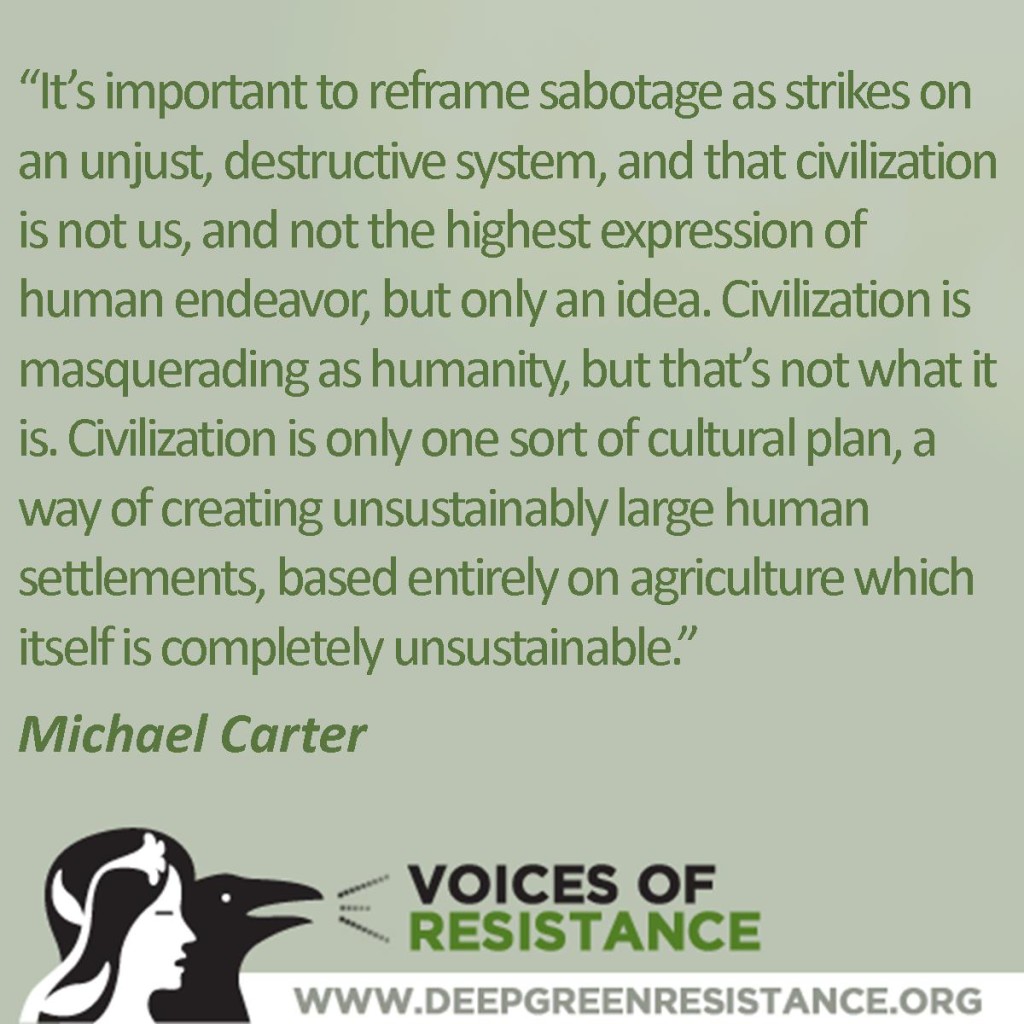
TS: I assume you didn’t just wake up one day and decide to attack bulldozers and billboards. What was your path from being apolitical to having the determination and the passion to do what you did?
MC: When I was struggling with high school, my brother loaned me a stack of Edward Abbey books, which presented the idea that wilderness is the real world, precious above all else. The other part was living in northwest Montana, where you see deforestation anywhere you look. You can’t not notice it, and there’s something about those scalped hills and skid trails and roads that triggers a visceral, angry response. It’s less abstract than atmospheric carbon or drift-net fishing. You don’t see those things the way you see denuded mountainsides. My family heated the house with wood, and we would sometimes get it out of slash piles in the middle of clearcuts. I had lots of firsthand exposure to deforested land. I wondered why the Sierra Club didn’t do something about it, how it could be allowed. We would occasionally go to Canada, and it was even worse up there. No one can feel despair like a teenager, and I had it in spades. If Greenpeace won’t stop this, I reasoned, well then I will.
I started building an identity around this, though, and that’s disastrous for a person choosing underground resistance. You naturally want others to know and appreciate your feelings and accomplishments, especially when you’re young, but the dilemma underground fighters face is that they must present another, blander identity to the world. That’s hard to do.
TS: You were fairly isolated in your actions, and you’ve emphasized the importance of a larger context. Do you see those two ideas connecting? Do you think saboteurs should be acting in a larger movement?
MC: I think saving the planet relies completely on the coordinated actions of underground cells coupled with an aboveground political movement that isn’t directly involved in underground actions. When I was underground, I had no hope of building a network, mostly because of a lack of emotional and political maturity. I also didn’t have the technological or strategic savvy, or a means of communicating with others. The actions themselves were mostly symbolic, and symbolic actions are a huge waste of risk. They’re a waste of political capital too. Most everyone is going to disagree with underground activism and it’s not going to change anyone’s mind about the policy issue—hardly anything will—so it has to count in the material realm. If people are ready and willing to risk their lives and their freedom then they should fight to win, not just to make some sort of abstract point.
TS: After you were arrested, what support—if any—did you receive from folks on the outside, and what support would you have wanted to receive?
MC: The most important support was financial, but there wasn’t a lot of it. Our plea bargain didn’t guarantee we wouldn’t go to prison. We were also worried that the feds would indict us for racketeering, an anti-Mafia charge with serious minimum sentencing. If we’d had more legal defense financing we’d of course have felt a lot more secure, but twenty years of reflection tells me we didn’t really deserve it considering how poorly we executed the actions, what little effect they caused.
That sounds like I’m being awfully hard on myself, and hindsight is always 20/20, but the point is that a legal crisis is exhausting and expensive. Your community will question whether your actions are worthy of the price they’ll have to pay if you’re caught. My actions were not.
Even so, I appreciated any sort of support. Hearing from the outside in jail is better than you’d believe. A lot of Earth First! Journal readers sent me anonymous letters. I wrote back and forth with one of the women who was jailed for noncooperation with a federal grand jury investigating the Animal Liberation Front in Washington. Seeing approving letters to the editor in the papers was also great. Just knowing that the whole world isn’t your enemy, that someone is thinking about you and appreciates what you did, is priceless.
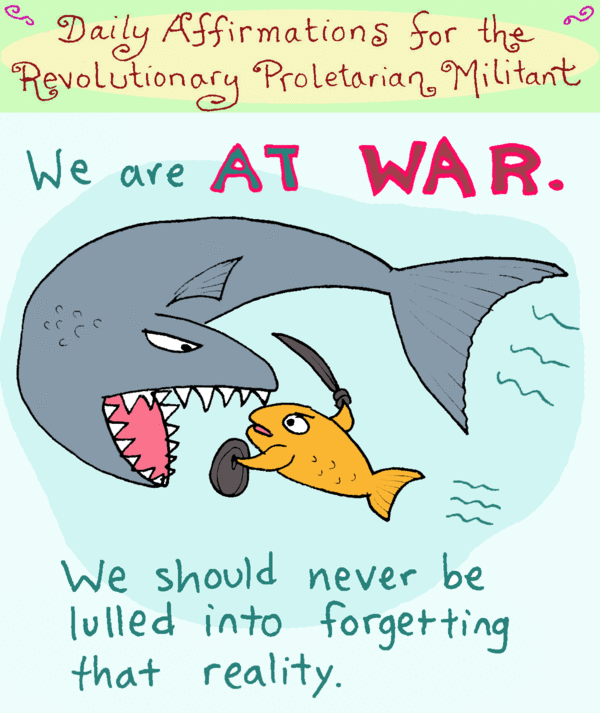
Artwork by Stephanie McMillan
TS: Do you still think militant and illegal forms of direct action and sabotage are justified? Why?
MC: I do, yes. In an ideal world I don’t think violence is the best way to accomplish anything, but obviously this isn’t an ideal world. Our circumstances are getting worse and worse—overpopulation, pollution, oceanic dead zones, you name it—and any options for a decent and dignified future for humanity are dwindling day by day, so what choice does that leave us? Individual attempts at sustainable living won’t work so long as the industrial system is running. The dismantling of infrastructure is the most important missing piece right now. It’s where the system is most vulnerable, so it should be employed right away. It can be effective, but it has to be responsible, careful, and extraordinarily smart.
One of the reasons underground political actions are so unpopular is that they’re always presented as attacks on individuals, rather than on a system. I think it’s important to reframe sabotage as strikes on an unjust, destructive system, and that civilization is not us, and not the highest expression of human endeavor, but only an idea. Civilization is masquerading as humanity, but that’s not what it is. Civilization is only one sort of cultural plan, a way of creating unsustainably large human settlements, based entirely on agriculture which itself is completely unsustainable.
The argument that militant actions are counterproductive has a little bit of merit because the scale they’ve happened on hasn’t been large enough to have any impact. For example, the Earth Liberation Front burning SUV’s. You’re left with the political fallout, the mainstream activists distancing themselves and all the other bad stuff that comes with it, but you don’t have any measurable gain, in reducing carbon emissions, say. Sabotage needs to happen on a larger scale, against more expensive targets, to be impactful. Fighters need to think big. That’s how militaries accomplish their goals—by acting against systems. They blow up bridges, they take out buildings, they disable the enemy arsenal, they kill the enemy—that’s how they function. I agree activists don’t want to identify with militarism, but it’s foolhardy to not consider what’s actually going to get the job done, and militaries know how to do that. No moral code will matter if the biosphere collapses. Doctrinal non-violence isn’t going to have any relevance in a world that’s 20 degrees hotter than it is now.
I wish an effective movement could be nonviolent, but we just don’t have enough social cohesion to orchestrate that kind of thing. There’s so few of us who give a shit, and we’re scattered, isolated, and disenfranchised. We don’t have adequate numbers, influence, or power, and I don’t see that changing. Everywhere we look we’re losing, because we don’t have a movement that can say, “No. You’re not going to do that. We will stop this, whatever it takes,” and back that up. Aboveground activists need to advocate a lesser evil, to continually pose the question of what is worse: that some property was destroyed, or that sea shells are dissolving in acid oceans? Underground activists need to act that out. It’s not a rhetorical question.
We need to remember, too, that small numbers of people can engineer profound changes when their actions are wisely leveraged. Very few took part in the resistance movements of World War II, but they made all the difference to ultimately defeating the Axis.
Interview continues here.
Time is Short: Reports, Reflections & Analysis on Underground Resistance is a bulletin dedicated to promoting and normalizing underground resistance, as well as dissecting and studying its forms and implementation, including essays and articles about underground resistance, surveys of current and historical resistance movements, militant theory and praxis, strategic analysis, and more. We welcome you to contact us with comments, questions, or other ideas at undergroundpromotion@deepgreenresistance.org









